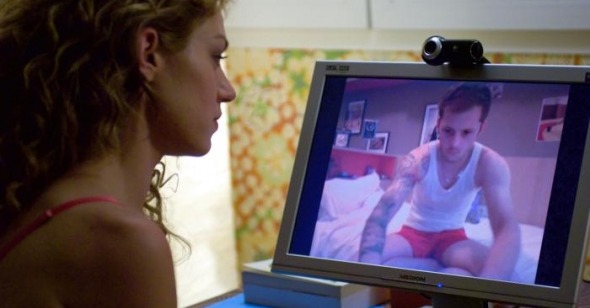Lives in Motion
by Michael Koresky
The Girl on the Train
Dir. André Téchiné, France, Strand Releasing
There’s a brilliant tension at the heart of the new film by the consistently challenging French director André Téchiné, The Girl on the Train. This is a work about an ambiguity—its disturbing central event is an act fueled by mysterious motivation, and it’s enacted by a character whom we only think we have come to know and understand, a young Parisian woman named Jeanne (Emilie Dequenne). Yet, as is the case with Téchiné, the film is shot with a searching, unceasing motion that digs deep into the images onscreen, looking for answers. Téchiné’s cinema is tactile, penetrative; with the help of director of photography Julien Hirsch (the immensely talented cinematographer of Godard’s In Praise of Love and Téchiné’s recent Changing Times and The Witnesses), he wishes to get the bottom of what makes this character tick. Yet certain aspects of human nature are simply impenetrable.
This doesn’t stop the director from sidling up as close as possible to the people at the center of this story, which is based on a true-life incident that took French media by storm in 2004. The film opens by rocketing into Paris from the perspective of the front of an RER train (the transit system serving Paris and its outlying suburbs), before moving to its first images of rollerblading Jeanne, also constantly moving forward. Dequenne, best known for astonishingly inhabiting the doughty force of nature that was the Dardenne brothers’ title character in Rosetta, is here a striking vision in long, curly red hair, which whips in the breeze as she glides heedlessly through the city. And like Rosetta, Jeanne opens the film unemployed and searching for work, although she has little of Rosetta’s desperate determination; she’s more of a wayward twentysomething with no direction, and her widowed mother, Louise (Catherine Deneuve), with whom she lives, seems to take more of an active role in her daughter’s job hunt than Jeanne. Of course when romance (or more, accurately, sexual excitement) comes knocking, in the form of a dangerously seductive amateur wrestler named Franck (Nicolas Duvauchelle, recently seen as Isabelle Huppert’s possibly psychotic layabout son in White Material), all other matters get put aside. For money, the two young people end up caretakers of a shady electronics dealer’s store; meanwhile Louise quietly seethes, not quite trusting Franck, who’s forward yet shifty, “He’s a straight talker . . . Bordering on aggressive,” she tells her overly trusting daughter.
With such a set-up, The Girl on the Train seems to be heading in one direction, even though Téchiné, working very loosely from a play by Jean-Marie Besset, sets things on a completely different trajectory than expected. A burst of violence occurs, and the result of this may seem, behaviorally, a non sequitur; but Téchiné’s vision of contemporary life makes it somehow coalesce. Jeanne’s actions, which kick off the film’s second half (it’s literally divided into two chapters), are inspired by events that many American viewers may not know about—though we’ve certainly had our equivalents here in recent years—and which are better to not spoil. For The Girl on the Train shouldn’t be defined by this seemingly random action—it would be devalued to a gimmick. Rather than sensationalize, Téchiné is more interested in reconciling matters of national and racial identity with the experiences of day-to-day living, and questioning our tendencies toward victimhood.
The Girl on the Train (that generic-sounding American title is translated from the more specific La fille du RER) is an immediate film—like those trains shuttling past countless homes and people, and like its protagonist, it forges ahead, picking up pieces of lives along the way. Téchiné, always pragmatic yet warm and spontaneous, makes room for a parallel narrative of sorts, that of a family fated to intersect with Jeanne and Louise when the latter recommends that her daughter apply for a job at the office of Samuel (Michel Blanc), a former flame of Louise’s. The love lives of Samuel’s grown son, Alex (Mathieu Demy) and Alex’s ex-wife, Judith (Ronit Elkabetz, from Late Marriage and The Band’s Visit), are briefly touched upon, yet somehow become a crucial thread of this tapestry, as does their wise son, Nathan (Jeremy Quaegebeur), on the eve of his bar mitzvah. None of these relations are painted in those broad strokes of “interconnection” we’ve grown accustomed to in movies as of late; rather, these are moments of ongoing lives that Téchiné believes deserve screen time as much as those who perpetrate the central narrative. There are many quiet shocks in The Girl on the Train, but nothing surprises as much as this fine artist’s continued generosity of spirit and constant sense of discovery, even in a film that questions many of the most cynical of human instincts.
